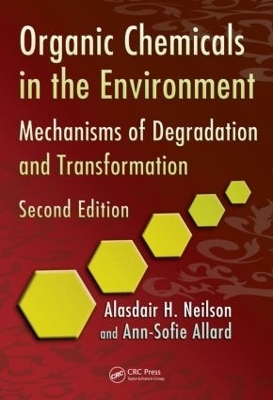
Organic Chemicals in the Environment
Crc Press Inc (Verlag)
978-1-4398-2637-9 (ISBN)
- Titel z.Zt. nicht lieferbar
- Versandkostenfrei innerhalb Deutschlands
- Auch auf Rechnung
- Verfügbarkeit in der Filiale vor Ort prüfen
- Artikel merken
The book begins by providing a broad perspective on abiotic and biotic reactions, including the significance of a range of environmental determinants. The following chapters briefly introduce experimental procedures and emphasize those procedures for establishing the structure of metabolites using isotopes and physical methods. Next, the authors outline details of biochemical reactions involved in the biodegradation of the major groups of aliphatic, carbocyclic aromatic, and heterocyclic compounds. They end with coverage of bioremediation that has attracted increasing concern because of the hazard presented by the disposal of unwanted chemicals or by-products from their manufacture.
Broad and comprehensive, this book provides a cohesive treatment of the subject. It contains an extensive set of literature references and numerous illustrative figures. The authors use a mechanistic approach with emphasis on the pathways, and the principles that emerge provide a guide not only for specific compounds but also for those having a more remote structural resemblance.
Alasdair H. Neilson was Principal Scientist until retirement from IVL Swedish Environmental Research Institute in Stockholm. He studied chemistry at the University of Glasgow and took his Ph.D. in organic chemistry in Alexander Todd's laboratory at Cambridge University. He carried out further research at Cambridge University in organic chemistry, and in theoretical chemistry with Charles Coulson at Oxford University. He held academic positions in the universities of Glasgow and Sussex, and obtained industrial experience in the pharmaceutical industry. He consolidated his experience by turning to research in microbiology during a prolonged stay with Roger Stanier and Mike Doudoroff at the University of California, Berkeley. His interests have ranged widely and included studies on nitrogen fixation, carbon and nitrogen metabolism in algae, and various aspects of environmental science including biodegradation and biotransformation, chemical and microbiological reactions in contaminated sediments, and ecotoxicology. With his group of collaborators, these studies have resulted in publications in Applied and Environmental Microbiology, Journal of Chromatography, Environmental Science & Technology, and Ecotoxicology & Environmental Safety, and in chapters contributed to several volumes of The Handbook of Environmental Chemistry. He is a member of the American Chemical Society, the American Society for Microbiology, the American Society of Crystallography, and the American Association for the Advancement of Science (AAAS). Ann-Sofie Allard studied as a chemical microbiologist and is currently a Senior Microbiologist at IVL Swedish Environmental Research Institute in Stockholm. She has carried out research on a wide range of water quality issues including the distribution of Yersinia enterocolitica in Swedish freshwater systems, and processes for the removal of hormone disrupters. She has carried out extensive studies on the biodegradation and biotransformation of organic contaminants, and in ecotoxicology, and she has implemented independent studies on the uptake and metabolism of organic contaminants and metals in higher plants in the context of bioremediation. Her studies have been published in Applied and Environmental Microbiology, International Biodeterioration and Biodegradation, Environmental Chemistry and Ecotoxicology, and Journal of Environmental Science and Health, and in chapters contributed to several volumes of The Handbook of Environmental Chemistry. She is a member of the American Chemical Society.
Experimental Aspects. Abiotic Reactions. Microbiological Reactions. Mechanisms for the Introduction of Oxygen and Reduction. Parameters. Metabolism of Xenobiotics by Higher Organisms. Pathways of Degradation and Transformation: Aliphatic and Alicyclic Compounds. Pathways of Degradation and Transformation: Aromatic Carbocyclic Compounds. Pathways of Degradation and Transformation: Heterocyclic Aromatic Compounds. Microbiological Aspects of Bioremediation.
| Erscheint lt. Verlag | 5.10.2012 |
|---|---|
| Zusatzinfo | 48 Tables, black and white; 415 Illustrations, black and white |
| Verlagsort | Bosa Roca |
| Sprache | englisch |
| Maße | 178 x 254 mm |
| Gewicht | 1905 g |
| Themenwelt | Naturwissenschaften ► Biologie ► Ökologie / Naturschutz |
| Naturwissenschaften ► Chemie ► Organische Chemie | |
| ISBN-10 | 1-4398-2637-4 / 1439826374 |
| ISBN-13 | 978-1-4398-2637-9 / 9781439826379 |
| Zustand | Neuware |
| Haben Sie eine Frage zum Produkt? |
aus dem Bereich


